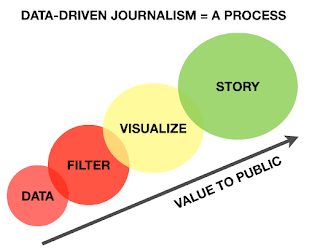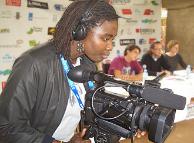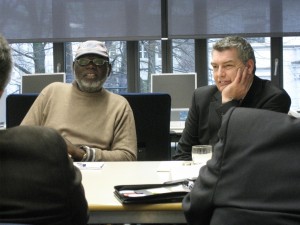#ugandavotes – the impact of social media in reporting elections
.jpg)
Facebook and Twitter are well established tools of the trade for many journalists but less so in countries such as Uganda. However, the recent elections may well have changed that. In a guest blog post, Ruth Aine a journalist from the Radio station Power FM in Kampala, describes the rise of social media during Uganda's recent elections.
![]() read more
read more
The biggest media company in the Philippines aims for the Internet generation
"Don't wait for the young audience to listen to the radio. Go to where they are – and that means going online and going social networks," says Peter A. Musngi. He is the head of the Manila radio division of ABS-CBN, the largest media company in the Philippines.
The best of multimedia formats
 The Web offers infinite possibilities. But not all of them are practical, necessary or recommendable. There are three basic rules that apply to multimedia productions: Less is more; it’s the story that counts; and the concept is more important than effects. This presentation shows you some multimedia formats that are worth a closer look.
The Web offers infinite possibilities. But not all of them are practical, necessary or recommendable. There are three basic rules that apply to multimedia productions: Less is more; it’s the story that counts; and the concept is more important than effects. This presentation shows you some multimedia formats that are worth a closer look.
![]() read more
read more
Trying to define data driven journalism
 A decade ago the use of extensive databases for reporting was difficult, time-consuming and expensive. Databases were mainly used by investigative journalists. The situation is very different today. Entire collections of data are now available online, often for free. They are easy to browse thanks to open source navigation tools. Lorenz Matzat wrote this guest blog post on data driven journalism.
A decade ago the use of extensive databases for reporting was difficult, time-consuming and expensive. Databases were mainly used by investigative journalists. The situation is very different today. Entire collections of data are now available online, often for free. They are easy to browse thanks to open source navigation tools. Lorenz Matzat wrote this guest blog post on data driven journalism.
![]() read more
read more
Talented African journalists tell their stories
 African journalists have long voiced their concerns about the way Africa is often misrepresented in the media of developed countries.There's no single Africa. It's a vast continent. A continent of diverse peoples and a continent with complex problems to solve.
African journalists have long voiced their concerns about the way Africa is often misrepresented in the media of developed countries.There's no single Africa. It's a vast continent. A continent of diverse peoples and a continent with complex problems to solve.
African Stories is an opportunity to start setting the record straight by supporting African journalists to tell their stories the African way. How do they see their own country and their continent? What issues do they consider relevant? What stories do they want to tell?
![]() read more
read more
Struggle for press freedom in Zimbabwe
Hopes for greater press freedom in Zimbabwe grew when a power-sharing government was formed following the elections in 2008. The new government has however not lived up to the expectations of many people in the media industry. The DW-AKADEMIE will host a conference on Media Training and Capacity Building Needs in Harare on February 25.
To gain an insight into the current press situation we spoke to the Zimbabwean media expert, Luckson Chipare, who coordinates the DW-AKADEMIE media development project in Zimbabwe.

L. Chipare with DW-AKADEMIE's P. Leusch Bonn
![]() read more
read more
…and action! Cinema sans convention
Once again the Berlin International Film Festival, also known as the Berlinale, has become the focus of filmmakers and movie buffs from around the world. Every year, DW-AKADEMIE conducts a five-week workshop centered around the red-carpet event. Called “Film Festival and Event Management”, the workshop spotlights young film festival managers from Asia and Africa.
Two of this year's 12 participants are Luzviminda Casagan from Pasay City, the Philippines, and Arthur Mataruse from Cape Town, South Africa. Casagan works for the Cinemalaya Independent Film Festival, Mataruse for Encounters and the Out in Africa film festivals. We spoke to both of them to find out more about film festivals and filmmaking in their home countries.
How would you describe the importance of films in cinema and television in your home country?
 Arthur Mataruse (pictured left): For us, films mainly have the function to strengthen the culture and the common identity in South Africa. Our aim is also to show other cultures and lifestyles.
Arthur Mataruse (pictured left): For us, films mainly have the function to strengthen the culture and the common identity in South Africa. Our aim is also to show other cultures and lifestyles.
Luzviminda Casagan: In the Philippines, fewer and fewer people are going to the cinema. One reason is that it is now easier to get films on DVD or from the Internet. Consequently, it's becoming more difficult for filmmakers to distribute and sell their films. Our aim with the Cinemalaya Independent Film Festival is to support young Philippine filmmakers whose films provide new insights and pursue new concepts, especially when that promotes art and culture.
![]() read more
read more
More than films – running a film festival
Once again the Berlinale is bringing together film-makers, critics and fans from all over the world. Every year to coincide with this important film festival, the DW-AKADEMIE conducts an intensive five week workshop: Film Festival and Film Management for young festival promoters from Africa and Asia.
Arthur Mataruse from Capetown, South Africa, and Luzviminda Casagan from Pesay City in the Philippines are among the participants. Mataruse works for Encounters and the Out in Africa Film Festivals and Casagan works for the Cinemalaya Independent Film Festival.
We spoke to both of them to find out more about film festivals and film-making in their home countries.
How would you describe the importance of films in your home country?
 Arthur Mataruse: For us, films mainly play the role of strengthening culture and common identity in South Africa. Our aim is also to show other cultures and lifestyles.
Arthur Mataruse: For us, films mainly play the role of strengthening culture and common identity in South Africa. Our aim is also to show other cultures and lifestyles.
Luzviminda Casagan: In the Philippines, fewer people are going to the cinema. One reason is because films are easier to find on DVD or on the internet. That means it's more difficult for film-makers to distribute and sell their films. Our aim with the Cinemalaya Independent Film Festival is to support young Filipino film-makers whose films provide new insights and pursue new concepts, especially to promote art and culture.
![]() read more
read more
Taking first steps into multimedia with audio slideshows
For any journalist who has spent most of their career working only in one medium, be it in radio, print or photography, taking your first steps into multimedia can be exciting but also a little daunting.
One of the tools that many journalists in our workshops get really excited about is Soundslides. It's a programme that produces audio slideshows by combining photos and audio. For radio and print journalists it's a new way to add images to their storytelling, and for photo journalists to add narration and sound to their photos. Plus it’s affordable and very easy to use.
![]() read more
read more
Using a mobile phone for reporting in Sierra Leone
 When it comes to mobile phones, working as a journalist in Germany means working in a fast internet 3G and wifi-wonderland. A mobile phone has long been an essential reporting tool for journalists, especially for broadcast media, but the increasing range of smartphones offer a lot more features for news gathering and reporting or "mobile journalism". A smartphone offers journalists a pocket-sized device to access the net and social media applications, a good camera for photographs as well as video and/or an audio recorder for producing radio reports.
When it comes to mobile phones, working as a journalist in Germany means working in a fast internet 3G and wifi-wonderland. A mobile phone has long been an essential reporting tool for journalists, especially for broadcast media, but the increasing range of smartphones offer a lot more features for news gathering and reporting or "mobile journalism". A smartphone offers journalists a pocket-sized device to access the net and social media applications, a good camera for photographs as well as video and/or an audio recorder for producing radio reports.
Wherever I travel, I'm always keen to test local networks and see how practical mobile phones might be for a mobile journalist or mojo – especially in Africa.
![]() read more
read more








Feedback